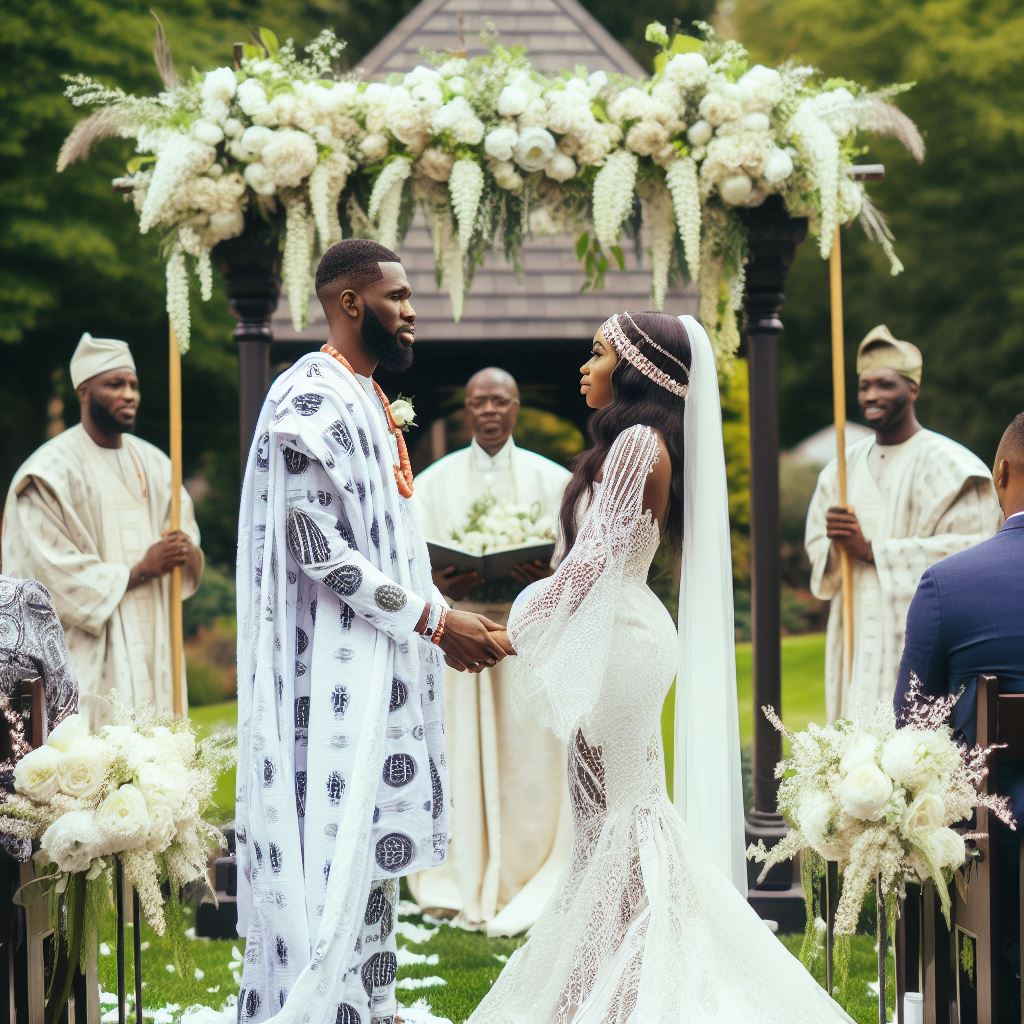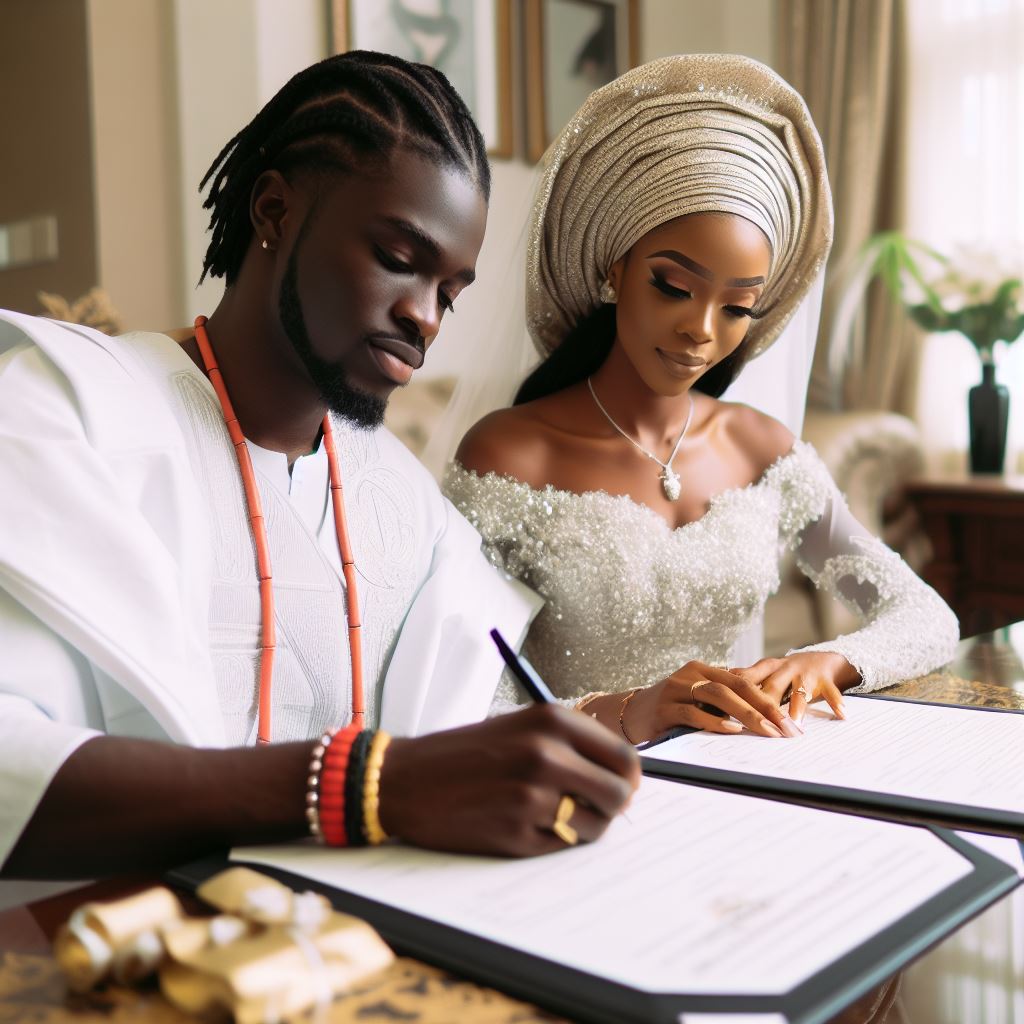Introduction
Brief explanation of Nigerian cultural celebrations
Nigerian traditions in weddings and Nigerian cultural celebrations involve rich traditions and customs that are significant in their culture.
Importance of integrating Nigerian traditions in US weddings
Integrating Nigerian traditions in US weddings brings diversity, uniqueness, and a sense of heritage.
Preview of topics that will be covered in the blog post
This blog post will cover the importance of Nigerian traditions in US weddings and provide a preview of the topics discussed.
Nigerian cultural celebrations are a kaleidoscope of traditions—colorful attire, rhythmic music, and symbolic ceremonies defining heritage.
Infusing Nigerian traditions into US weddings adds depth, fostering a rich tapestry of cultural diversity.
- Traditional Attire: Explore the vibrant fabrics and intricate designs that narrate tales of ancestry.
- Ceremonial Dances: Dive into the rhythmic beats, uniting families and adding a joyful ambiance.
- Symbolic Rituals: Discover the significance of rituals like breaking kola nuts, representing unity and respect.
- Culinary Delights: Indulge in the flavors of Nigerian cuisine, making the wedding a gastronomic adventure.
- Music and Drums: Experience the heartbeat of Nigeria through traditional music, setting the celebratory tone.
- Bridal Henna: Uncover the artistry of henna, a symbol of love and good fortune.
By embracing these elements, couples can create a wedding experience that not only unites hearts but also bridges cultures.
Overview of Nigerian Wedding Traditions
Nigerian wedding traditions are rich in culture and hold significant importance in the lives of Nigerians. These traditions have been passed down through generations and are cherished as a way to connect with their heritage.
In this blog section, we will explore the various aspects of Nigerian wedding traditions, from pre-wedding rituals to post-wedding celebrations.
Pre-wedding traditions
Before the actual wedding day, Nigerian couples engage in several pre-wedding traditions.
- One of the most important events is the traditional engagement ceremony, also known as the introduction ceremony.
- This ceremony is a formal meeting between the families of the bride and groom, where they officially accept each other and exchange gifts.
- It is a significant step towards the union of the couple and brings the families closer.
- Another pre-wedding tradition in Nigerian culture is the concept of the bride price and dowry.
- The groom’s family presents a bride price to the bride’s family as a token of appreciation and respect.
- This practice symbolizes the groom’s commitment to taking care of his bride and contributes to strengthening family ties.
Wedding day rituals
The wedding day in a traditional Nigerian wedding is a culmination of various rituals and customs.
- One of the highlights is the attire and beauty preparations. The bride and groom dress in stunning traditional outfits, reflecting their cultural heritage.
- They also adorn themselves with intricate jewelry, which holds cultural and symbolic significance.
- The wedding ceremony itself includes numerous ceremonial rituals and customs. Cultural dances, songs, and prayers are performed to bless the union of the couple.
- These rituals are believed to invoke the presence and blessings of ancestors and deities, ensuring a successful and happy marriage.
- Symbolic elements such as pouring libations and breaking kolanut play a crucial role in Nigerian wedding ceremonies.
- Pouring libations is a ritual where a liquid, usually palm wine or water, is poured on the ground as an offering to ancestors.
- Breaking kolanut, on the other hand, is a way to honor and seek their blessings. These customs represent the importance of ancestral connections and seeking their guidance in the couple’s journey.
Post-wedding customs
After the wedding day, Nigerian couples continue to celebrate their union through post-wedding customs.
- Traditional Nigerian parties known as “Aso Ebi” parties are an integral part of these celebrations.
- These parties serve as an opportunity for extended family and friends to come together, celebrate the couple’s marriage, and strengthen family bonds.
- Gift-giving and sharing of blessings are also significant in Nigerian post-wedding customs. Guests shower the newlyweds with gifts, often in the form of money.
- This gesture symbolizes support, well wishes, and blessings for a prosperous future. The sharing of blessings extends beyond the couple, as they often give back to the community or less fortunate individuals to spread their happiness and abundance.
In summary, Nigerian wedding traditions encompass a wide range of rituals and customs that hold deep cultural significance.
From pre-wedding traditions like engagement ceremonies and bride price customs to wedding day rituals such as attire preparations and symbolic elements, and post-wedding customs like traditional parties and gift-giving, these traditions bind families and communities together while honoring their heritage.
Read: The Importance of Prenuptial Agreements in the USA for Nigerians
Challenges and Solutions for Incorporating Nigerian Traditions
Incorporating Nigerian traditions in US weddings can be an exciting and meaningful experience. However, it is not without its challenges.
This section will explore some of the common challenges faced during the process and provide solutions to overcome them.
Language and cultural barriers
- Communication with non-Nigerian guests is crucial to ensure everyone feels included and informed about the traditions being incorporated. Clear explanations and instructions should be provided.
- Utilizing translation services or sending bilingual invitations can help bridge any language barriers and ensure that all guests understand important details about the wedding.
Venue and decor considerations
- Balancing traditional Nigerian aesthetics with modern wedding venues can be a challenge. Finding a venue that allows for incorporating cultural elements while still maintaining a contemporary atmosphere is essential.
- Incorporating Nigerian motifs and colors in the wedding decor can help create a vibrant and culturally rich ambiance. Using traditional fabrics, patterns, and colors can bring a touch of Nigeria to the venue.
Bridal party and guests’ involvement
- Educating and engaging non-Nigerian bridal party members about the significance of the traditions being incorporated is important. Providing resources, such as books or online materials, can help them understand and participate actively.
- Encouraging guests to actively participate in cultural traditions can be done through various means. Providing cultural attire options or organizing interactive activities can create an inclusive and engaging experience for all.
Entertainment choices
- Blending Nigerian and American music for the reception can cater to the diverse musical preferences of the guests. A DJ or live band can create a playlist that includes both Nigerian and American hits, ensuring everyone enjoys the celebration.
- Showcasing Nigerian dance performances can be a highlight of the wedding entertainment. Hiring professional Nigerian dancers or incorporating traditional dance routines can add a unique and lively element to the celebrations.
In fact, while incorporating Nigerian traditions into US weddings may pose certain challenges, there are always solutions available.
Effective communication, thoughtful venue and decor choices, educating and engaging the bridal party and guests, as well as blending entertainment choices, can result in a culturally rich and memorable wedding celebration that seamlessly merges Nigerian and American traditions.
Read: Green Card Through Marriage: A Guide for Nigerian Citizens

Benefits of Integrating Nigerian Traditions
Integrating Nigerian traditions into US weddings brings numerous benefits that extend beyond the celebration itself.
These advantages include the preservation of cultural heritage, the creation of a unique and memorable experience, and the strengthening of family bonds.
Preserving cultural heritage
One significant benefit of integrating Nigerian traditions is the preservation of cultural heritage.
Maintaining connections to Nigerian roots
- By incorporating elements of Nigerian culture in weddings, individuals can maintain their connections to their Nigerian roots.
- This integration helps individuals remember and honor their ancestral heritage, allowing them to hold onto their roots even while living abroad.
Passing down traditions to future generations
- Furthermore, incorporating Nigerian traditions in weddings enables individuals to pass down these traditions to future generations.
- Weddings serve as important cultural events where traditions, customs, and rituals can be shared and learned.
- By including these traditions in weddings, couples can ensure that future generations will have a deep understanding and appreciation for Nigerian culture.
Creating a unique and memorable experience
In addition to preserving cultural heritage, integrating Nigerian traditions also creates a unique and memorable experience for both the couple and their guests.
Standing out from traditional American weddings
- In traditional American weddings, certain elements can seem familiar and predictable.
- However, by infusing Nigerian customs into the celebration, the couple stands out from the crowd, making their wedding a distinct and unforgettable event.
- Guests, too, will be delighted by the opportunity to experience a different culture firsthand, creating lasting memories.
Providing an immersive cultural experience for guests
- Moreover, integrating Nigerian traditions provides an immersive cultural experience for guests.
- From the attire to the music and dance, guests are able to engage with Nigerian customs and gain a deeper understanding of the rich Nigerian culture.
- This experience allows individuals to broaden their horizons, appreciate diversity, and foster cultural exchange.
Strengthening family bonds
Another advantage of integrating Nigerian traditions is the strengthening of family bonds
Involving families in the wedding planning process
- Involving families in the wedding planning process fosters a sense of togetherness, unity, and shared responsibility.
- Certain Nigerian traditions emphasize the importance of family, and by incorporating these traditions, couples show appreciation for their families’ support and love.
Fostering a sense of unity and belonging
- Furthermore, integrating Nigerian traditions helps create a sense of unity and belonging.
- Weddings are often considered a celebration of love not only between the couple but also between families.
- Nigerian traditions symbolize unity and the joining of two families, reinforcing bonds and fostering a sense of belonging within a larger community.
In general, integrating Nigerian traditions into US weddings offers numerous benefits.
It helps preserve cultural heritage, pass down traditions to future generations, create a unique and memorable experience, provide an immersive cultural experience for guests, strengthen family bonds, and foster a sense of unity and belonging.
By embracing Nigerian customs in weddings, couples can celebrate their heritage, create lasting memories, and embrace the richness of their cultural identity.
Read: Why Some Nigerians Opt for Destination Marriages in the USA
Real-Life Examples and Inspirations
In this section, we will explore real-life examples and inspirations from Nigerian-Americans who have successfully integrated Nigerian traditions into their weddings.
These stories serve as a source of inspiration and guidance for couples looking to infuse their Nigerian heritage into their special day.
Personal Stories of Nigerian-Americans
- Sharing personal stories of Nigerian-Americans who have incorporated their cultural traditions into their weddings can provide valuable insights and ideas for others.
- These stories can highlight the significance of certain traditions, how they were incorporated, and the impact it had on the overall wedding experience.
- For example, we may feature a story about a Nigerian-American couple who opted for a traditional Yoruba engagement ceremony known as the ‘Introduction’ before their wedding.
- They can share their experience of how they embraced this tradition to honor their families and bring a sense of authenticity to their wedding celebration.
Photos and Videos of Nigerian-Inspired Weddings
- Visual representation is a powerful tool in showcasing the beauty and vibrancy of Nigerian-inspired weddings.
- Including a collection of photos and videos from real weddings can help couples envision how they can incorporate Nigerian elements into their own ceremonies.
- We can feature a variety of weddings, each highlighting different aspects of Nigerian culture.
- For instance, one wedding may showcase the bold and colorful traditional attire worn by the couple and their guests, while another can emphasize the energetic and rhythmic dances performed during the reception.
Popular Nigerian Wedding Vendors
- One significant aspect of planning a Nigerian-inspired wedding in the US is finding vendors who specialize in Nigerian traditions.
- This section will highlight popular Nigerian wedding vendors, such as caterers, decorators, DJs, and photographers, who have experience in creating culturally rich celebrations.
- We can provide profiles of vendors who understand the importance of incorporating Nigerian customs into weddings and have a deep appreciation for the cultural nuances.
- This will serve as a valuable resource for couples seeking assistance in finding professionals who are knowledgeable and skilled in executing Nigerian-inspired weddings.
By sharing personal stories, showcasing visual inspirations, and highlighting reputable vendors, this section will offer practical examples, ideas, and guidance for couples looking to integrate Nigerian traditions into their US weddings.
Read: Planning a Wedding: Venues and Laws Across US States
Conclusion
Recap of key points discussed in the blog post
- Overall, integrating Nigerian traditions into US weddings can be a wonderful way to celebrate diversity and honor one’s heritage.
- Throughout this blog post, we have explored the significance of cultural celebrations and the unique elements that Nigerian traditions bring to a wedding ceremony.
- We discussed the importance of incorporating Nigerian attire, such as the colorful Aso-ebi fabrics and gele headwraps, into the wedding party’s attire.
- These elements not only add beauty and vibrancy to the event but also allow guests to fully immerse themselves in the Nigerian culture.
- Furthermore, we highlighted the significance of Nigerian cuisine, with its rich flavors and traditional dishes like jollof rice and suya.
- By including these delicacies in the wedding menu, couples can create an unforgettable culinary experience for their guests.
Encouragement for couples to embrace and showcase Nigerian traditions
It is our sincere encouragement for couples planning their wedding to embrace their Nigerian heritage and proudly showcase their traditions.
By doing so, they not only create a memorable and meaningful celebration but also educate and inspire others about the beauty of Nigerian culture.
Closing thoughts on the beauty of cultural celebrations in weddings
In closing, cultural celebrations in weddings are a testament to the diverse world we live in. By intertwining traditions from different backgrounds, we not only celebrate love but also bridge the gap between cultures, fostering unity and understanding.
So, let us cherish and embrace the beauty of cultural celebrations in every wedding we witness.




